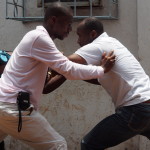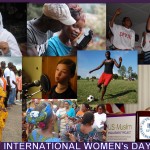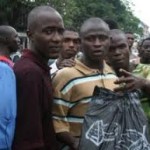Fasten Your Seatbelts: Shaking up Political Participation in Guinea

SFCG intern Julien Bolamou runs out in front to give the driver directions on the road from Conakry to N’Zerekore in Guinea.
By: Jacob Muirhead
The road from Conakry to N’Zerekore is a perilous one. I had heard mention of the quality of the Southern highway that connects Conakry with Guinea’s second largest city, as well as the southern portion of the country, before setting out, but I still wasn’t prepared for what lay ahead of me. When Magass, our driver for the mission, told me to buckle up, I laughed. Rules around driving etiquette—speed limits, alcohol consumption, number of people in, or on top of vehicles, and especially the need to wear seatbelts – are all matters for loose interpretation. The gravity of my situation dawned on me during this exchange when, without flashing his usual post-joke smile, Magass himself buckled up before firing up the engine of our soon to be not-so-white four-wheel drive Toyota Hilux pickup truck.
It turns out seatbelts really are a necessity for this trip. At one point paved, the highway between the two cities has fallen into disrepair. Without the same lucrative quantities of bauxite that are found predominantly to the north of Conakry, the quality of the roads in the south have not yet benefited from the same care and attention that mining companies and generous donors like the government of China have bestowed in the north of the country. More dirt and mud than anything else, hard, sharp remnants of pavement jut out dangerously at different angles with person-sized potholes not uncommon throughout vast stretches of the route. Indicative of the roughness of the road system, the trip, which is just over 1000 kilometers, took two 12-hour days of driving to arrive in the mining community of Beyla, the city from which I write this blog.

A boy and his father fixing their taxi in Gueckedou after the worst part of the road from Conakry to N’Zerekore.
While being bounced around like a pinball is pretty fun, the condition of the highway is a serious problem and just one of many examples of the basic challenges faced by Guineans every day. Transport trucks, taxis, and SUVs littered the overgrown shoulders of the highway. Some clearly had overheated, some had blown tires and unfortunately, many had lost control and lay flipped over in bushes or smashed against thick tree trunks next to the road. Injuries and loss of life aside, you can’t help thinking about the amount of economic activity lost as a consequence of transportation difficulties along this corridor— one that connects millions of Guineans. Indeed, although Guinea, and especially southern Guinea, is one of the most fertile places on the planet, with regular rain and sun, a warm tropical climate and rich soil, many go hungry around the country because farmers can’t get their rice and corn to markets, transport trucks and trains cant get staple goods from markets to cities and so on. The end result is an elevated price for agricultural goods that is prohibitively expensive for many.
I have been in Guinea for 7 weeks now, and am currently on the second of three field missions, which have taken me to the frontier cities of Beyla, Lola, and N’Zerekore, located just kilometers from the borders of the Ivory coast to the East and Liberia to the West. Tasked with conducting a baseline study of the various opportunities to be found in mining zones, my group is also looking into the potential conflicts that exist in these areas broadly—but also directly and indirectly as a result of the implantation of mining companies within local communities. Although mines employ thousands of people with well-paid jobs, environmental degradation, land displacement, misinformation, and a general lack of transparency on the part of mining companies and local authorities towards the local population are also all too often sources of conflict and tension. Once completed, I hope the research myself and my colleagues are conducting will help to inform future SFCG programming here in Guinea.
I can say that the experience so far has been humbling. But this job can also be difficult. Without a doubt, the problems and needs cited by the focus groups we interviewed outweigh the potential opportunities. You can feel the frustration, especially when you don’t have the means to intervene directly or to make any promises. However, every once and a while you are presented with moments that reinvigorate you and reaffirm your faith that change is a real possibility.
One of these moments came in Beyla while I was sitting with a women’s focus group collecting feedback on SFCG radio broadcasts. Search for Common Ground produces and diffuses four different radio programs in Guinea with near national coverage, in partnership with 34 rural and private radio stations. These programs are Wontanara, Djembe, Barada, and Sissi Aminata. Sissi Aminata is a program focused on the promotion and self-empowerment of women. Women are often marginalized in Guinea and traditionally left out of the political process. Sissi Aminata has been busy, among other things, informing women about their rights as well as their civic responsibility in anticipation of Guinea’s long overdue legislative elections, which should (with luck) occur in Guinea sometime near the end of this year. Having focused much of the questionnaire on the difficulties respondents had in listening to our radio programs, I arrived at the question, “have Search for Common Ground radio programs had an impact in your community?” Unexpectedly, one of the women in the group, a well respected leader in the community, leaned over to me with a gleam of excitement in her eyes to give me an answer:
“Oh yes! Men want to keep me out of the political process. They want to continue to marginalize the women of the community. The messages I hear in Sissi Aminata say women have power, women can participate and women can make a difference here. Because of the program, I’m running as a candidate in the next legislative elections.”
These are the impacts that make this job so gratifying.
While change is sometimes slow, having spoken with women all over the country, I have no doubt that these types of stories are becoming the norm. In the meantime, the candidate list for the upcoming elections in Beyla is already at least one name longer.
Jacob Muirhead is part of SFCG’s international internship program and has spent his summer working at SFCG’s office in Conakry, Guinea. He is currently studying for a Master of Arts in Global Governance at the Balsillie School of International Affairs in Waterloo, Canada and hopes to continue working in the humanitarian sector after graduation.









